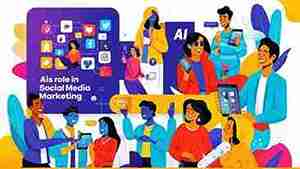Introduction to AI in Digital Marketing
AI plays a crucial role in the digital marketing industry, revolutionizing marketing strategies and consumer behaviour studies. By leveraging AI, businesses can employ data-driven marketing strategies, target specific consumer segments, and personalize marketing communication. AI in marketing analytics helps by quickly analyzing vast amounts of data, spotting trends, and predicting customer behavior. This leads to smarter, more personalized marketing strategies that connect better with your audience.More than half used AI for blogs, website content, social media and email contents[5]. 82% of marketers and communicators surveyed by The Conference Board expect that further adoption of AI will lead to productivity improvements, enhance learning and development and improve financial results

Why AI is a Game-Changer in Digital Marketing
Increased Efficiency – AI automates repetitive tasks like data analysis, email marketing, and social media posting.
Enhanced Personalization – AI analyzes customer preferences to deliver highly relevant content and product recommendations.
Better ROI – AI helps businesses allocate budgets efficiently by optimizing ad placements and reducing wasteful spending.
Lorem ipsum dolor sit amet, consectetur adipiscing elit. Ut elit tellus, luctus nec ullamcorper mattis, pulvinar dapibus leo.
AI-Powered Marketing Strategies
data driven insights
Data-driven insights are the information gathered from analyzing data to identify patterns, trends, and insights that help you make informed decisions. When businesses collect and analyze data (from customers, marketing, etc.), they reach conclusions that help them make better decisions.
predictive analytics
Predictive analytics is an advanced form of data analytics that attempts to answer the question, “What might happen next?” As a branch of data science for business, the growth of predictive and augmented analytics coincides with that of big data systems, where larger, broader pools of data enable increased data mining activities to provide predictive insights. Advancements in big data machine learning have also helped expand predictive analytics capabilities.
Key AI Technologies in Digital Marketing
Machine Learning & Predictive Analytics
AI algorithms analyze patterns in customer behavior to predict what they might purchase next.
Natural language processing (NLP)
Natural language processing (NLP) combines computational linguistics, machine learning, and deep learning models to process human language. Computational linguistics is the science of understanding and constructing human language models with computers and software tools.
Computer Vision
AI can recognize images and videos, enabling features like visual search (e.g., Google Lens) and automated product tagging in e-commerce.
Programmatic Advertising
Programmatic advertising is an automated way of buying and selling online ad space in real-time. Display ads tend to be banners or side ads on websites and are bought and placed using traditional methods. This usually means negotiating directly with website owners.
AI in SEO & Content Marketing

AI driven keyword research
AI also excels in data-driven insights. With the ability to analyze user intent, search patterns, and competitor strategies, AI keyword research tools provide comprehensive insights that help you refine your keyword strategies. This results in more targeted content that better aligns with user needs and behaviors.
AI-generated content
AI-generated content (AIGC) includes images, video and/or audio that is generated or modified by artificial intelligence, such as artificial visuals, videos, or sounds that may portray realistic human likenesses or depictions created in a particular artistic style
voice search optimization
Voice search optimization is the process of optimizing your website pages to appear at the top of the results when users conduct verbal searches. Voice search SEO is essential for ensuring your website appears in the results for users who use voice assistants.
AI in Paid Advertising
automated bidding
Automated bidding, often known as programmatic bidding, refers to a digital advertising strategy where bidding on ad placements is automatically managed by algorithms or software rather than manual input.
Audience targeting
Audience targeting is the ability to take your full audience of prospective customers and segment it into groups based on different criteria, including online behavioral characteristics, demographics, interests, and intent. Audience targeting helps you more effectively deliver personalized and optimized experiences based on customer needs and interests.
AI Across Various Marketing Channels
Email marketing
Email marketing is the use of email to promote products or services, as well as incentivize customer loyalty. It is a form of marketing that can make the customers on your email list aware of new products, discounts, and other services. Email marketing is one of the most effective and popular marketing tools.

Social media marketing
Social media marketing (SMM) is the use of social media platforms to promote products, services, or brands. It involves creating and sharing content—such as posts, images, videos, and ads—to engage with an audience, build brand awareness, drive website traffic, and generate leads or sales.

E-commerce
E-commerce (electronic commerce) refers to the buying and selling of goods and services online. It involves transactions conducted over the internet using websites, apps, and social media platforms.

The Future of AI in Digital Marketing
Artificial intelligence (AI) is no longer a concept or a technology focused on robots. It has a wide range of applications for marketers to automate tasks, personalize content, organize leads, or analyze and predict customer behavior.
That’s why there has been an explosion in new AI tools and technologies. Technology companies are racing to create bigger and better tools to help brands across industries improve productivity and increase efficiency.
AI is changing digital marketing It is offering people new ways to search and be found online, get tailored recommendations, communicate with brands (e.g. chatbots) and access information such as through voice search.

Conclusion: The Role of AI in Digital Marketing
AI has revolutionized digital marketing by enabling businesses to automate processes, personalize customer experiences, and make data-driven decisions. With advanced capabilities such as predictive analytics, chatbots, and AI-driven content creation, brands can optimize their marketing strategies for better engagement and higher conversion rates.
As AI continues to evolve, its role in digital marketing will only expand, offering even more innovative solutions for customer targeting, campaign optimization, and performance tracking. However, businesses must strike a balance between automation and human creativity to maintain authenticity and trust. Ultimately, AI empowers marketers to work smarter, delivering more effective and personalized marketing campaigns in an increasingly competitive digital landscape.